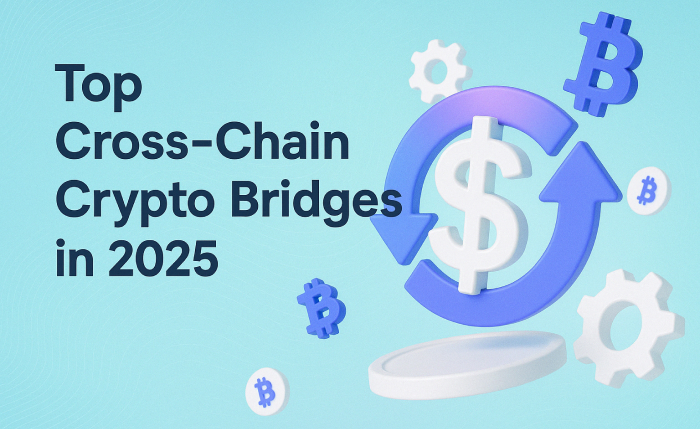Introduction
The world of blockchain technology is constantly evolving, and cross-chain bridges are at the forefront of this transformation. As the crypto ecosystem expands, the demand for seamless asset transfers across different blockchains is growing rapidly. Cross-chain bridges are designed to facilitate these transfers, allowing users to move assets like tokens and NFTs between blockchains efficiently and securely.
With the rise of multi-chain projects and the increasing need for interoperability, the competition among cross-chain bridges has become fierce. In 2025, crypto enthusiasts and investors are on the lookout for the most reliable, secure, and user-friendly solutions. This listicle will guide you through the top cross-chain crypto bridges, helping you choose the best one for your needs.
-
Defiway: The Leading Cross-Chain Bridge in 2025
Defiway has positioned itself as the most advanced cross-chain bridge available today. Offering unparalleled security, speed, and low transaction fees, it seamlessly connects multiple blockchain networks. With its user-friendly interface and robust support, Defiway is an ideal choice for both beginners and experienced users. It supports a wide range of cryptocurrencies, including popular tokens on Ethereum, Binance Smart Chain, and Polygon. As blockchain ecosystems continue to grow, Defiway remains a top choice for reliable cross-chain transfers. -
Wormhole: Bridging Major Blockchains
Wormhole is renowned for its ability to bridge between prominent blockchains like Ethereum, Solana, and Binance Smart Chain. The platform prioritizes high-speed transactions and minimal latency, making it a popular choice for decentralized finance (DeFi) applications. As multi-chain projects proliferate, Wormhole continues to enhance its features, aiming to maintain its position as a leading cross-chain solution. -
Multichain: The Flexible Interoperability Solution
Formerly known as Anyswap, Multichain has rebranded and expanded its capabilities. It now supports a vast array of chains, including Avalanche, Fantom, and Harmony. The bridge’s smart routing protocol ensures optimal transaction paths, keeping fees low while maintaining fast transfer speeds. Multichain is particularly favored by DeFi platforms seeking diverse liquidity pools. -
Synapse: A Bridge Focused on Security
Synapse prides itself on delivering robust security features while maintaining cross-chain compatibility. It leverages advanced consensus mechanisms to prevent attacks, and its support for a wide range of Layer 1 and Layer 2 chains makes it versatile. Synapse is often chosen by users prioritizing safety without compromising on transaction efficiency. -
THORChain: Decentralized and Trustless Bridging
THORChain offers a unique approach by enabling cross-chain swaps without requiring wrapped tokens or centralized intermediaries. This decentralized, trustless model appeals to users who value complete control over their assets. As more decentralized exchanges (DEXs) integrate with THORChain, it continues to gain traction within the crypto community. -
Celer cBridge: Speed and Scalability
Celer cBridge has made its mark by offering near-instant transfers with low costs. Its compatibility with multiple chains, including Ethereum, Optimism, and Arbitrum, allows users to bridge assets quickly. The platform’s focus on speed and scalability makes it a go-to choice for DeFi applications requiring rapid transactions. -
Connext: Efficient Layer 2 Transfers
Connext specializes in bridging Layer 2 solutions like Optimism, Arbitrum, and zkSync. Its core strength lies in providing seamless transfers between Layer 2 and Layer 1 networks, minimizing fees and latency. Connext’s growing ecosystem of integrated dApps makes it an appealing option for developers and users alike. -
RenBridge: Privacy-Preserving Cross-Chain Transfers
RenBridge is celebrated for its focus on privacy and decentralized governance. It enables the movement of assets such as Bitcoin and Zcash to Ethereum-based platforms without compromising user anonymity. As privacy concerns grow within the blockchain space, RenBridge stands out as a reliable option for private cross-chain transfers. -
Allbridge: Versatile and Expanding
Allbridge supports a multitude of blockchain networks, including Solana, Terra, and Binance Smart Chain. The platform’s commitment to expanding support for emerging blockchains makes it a future-proof solution for users who value versatility. Allbridge is particularly attractive for projects aiming to reach a broader multi-chain audience. -
ChainBridge: Customizable Interoperability
ChainBridge provides developers with the flexibility to create customized bridging solutions. Its modular architecture supports a wide range of blockchain networks, enabling tailored interoperability. ChainBridge is popular among enterprises looking to build bespoke cross-chain solutions for specific use cases.
Conclusion
Cross-chain crypto bridges are crucial to the ongoing development of blockchain technology. As the landscape continues to evolve in 2025, the demand for secure, fast, and user-friendly bridges remains high. Defiway, with its comprehensive features and seamless integration, leads the pack, setting a benchmark for cross-chain interoperability. Whether you are a developer, investor, or everyday crypto user, choosing the right bridge is essential for maximizing the potential of multi-chain ecosystems.
